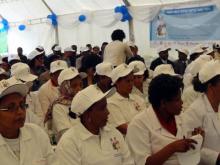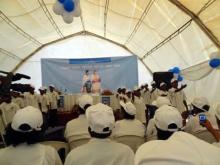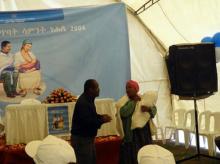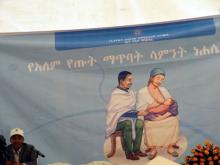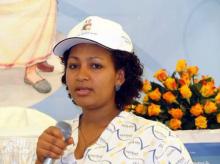Ethiopia Observes World Breast Feeding Week
Addis Ababa, 06-07 August 2012 -- Ethiopia observed the World Breast Feeding Week (WBFW) for the 4th time under the theme, “understand the past and plan for the future”. The WBFW, launched twenty years ago by the World Alliance for Breast Feeding Action (WABA), focuses on actions to protect, promote and support breastfeeding.
A series of events marking the occasion were undertaken in Addis Ababa: A Policy Level Panel discussion where the importance of Breast Feeding, with calls to support, protect and promote was advocated among medical professionals representing key players and partners including the media, at Hilton Hotel, on 6th July 2012.
The main event which took place at the Black Lion Hospital on 7th August 2012 featured with key note addresses by representatives of key partners, testimonials, drama and other activities. In attendance during both events were representatives from the Federal Ministry of Health (FMOH), UN Agencies, Development Partners, Mothers, Youth Groups, Students of the Addis Ababa University (AAU) Medical Faculty and Media Personnel.
Dr. Mahlet Yegeremu, Dean of AAU, Medical Faculty and Chief Executive Officer (CEO) of the Black Lion Hospital, who warmly welcomed invitees, gave some highlights on the role of breastfeeding in the reduction of maternal and under-5 mortality. She stated that the ceremonial event was a call to action for the general public, media, and other key stakeholders to play a greater role in providing every possible support to improve breastfeeding practices. She reiterated that her hospital would continue strengthening its efforts to ensure that mothers will adopt the recommended practices.
Dr. Mengsitu Tesfaye, representative of the Ethiopian Pediatric Association (EPA), on his part said, “The current insufficient level of exclusive breastfeeding in Ethiopia requires us to do a lot more to improve breast feeding practices further in Ethiopia.” He stated that the rationale for observing the occasion was to take the lessons from past efforts, uphold encouraging gains, and promote the good breastfeeding practices.
He underscored the need for enhancing mothers’ knowledge, skills and strongly encouraged health care providers and all other partners to discharge their responsibilities. In concluding his message, he said, “The EPA is deeply committed to intensify its collaboration with the FMOH and other stakeholders.”
Dr Joan Matji representing the Nutrition Development Partners (NDP) Group, a coordination mechanism of donors and implementing partners support for the National Nutrition Programme (NNP) in Ethiopia said that the coincidence of the event with the current review and update of the NNP can be seen as an opportunity to take appropriate actions.
In addition, she stated that the level of breastfeeding in developing world remained relatively stagnant over the years from 1995 through to 2010, only showing a 4% increase from 32%. She described the consequential effects of malnutrition in children in reference to the June 2012 meeting of the Ministers of India and Ethiopia in Washington, D.C., that pledged as part of the “Committing to Child Survival: A Promise Renewed” movement to work hard ending preventable child deaths. In regards to the current level of exclusive breastfeeding practices in Ethiopia, she emphasized the need to reflect and understand past breastfeeding experiences. She underscored the need to do more to improve the current level of exclusive breastfeeding which is only 52% according to the 2011 Ethiopia Demographic and Health Survey (EDHS).
Reflecting on the encouraging efforts undertaken by the event hosting Black Lion Hospital towards becoming a baby friendly hospital so as to provide support and encourage new mothers on optimal infant feeding practices, Dr. Matji assured the FMOH and the Management of the hospital that the NDP Partners are ready to provide every support for the hospital to be declared as the first Baby Friendly Hospital.
In his opening remark, Dr Tedros Bekele, Director of Urban Health Promotion & Disease Prevention (HPDP) Directorate of the FMOH, explained the commitment of the Government of Ethiopia in creating supportive enabling environment through appropriate policy and strategies to ensure that children and adolescents are protected from the health problems resulting from malnutrition. He mentioned that the FMOH has published a strategy to accelerate reduction of stunting and set targets to increase exclusive breast feeding practices among infants under - 5 months of age to 75% in the next 3 years.
Addressing the decent progress observed, Dr Tedros said, “Ethiopia has made a remarkable progress in reducing the level of underweight from 42% in 2000 to 28.7%, and that of stunting from 57.8% to 44.4%. In spite of these efforts, more needs to be done to address underlying causes of under nutrition in order to meet the MDGs target. He then urged everyone to promote breastfeeding practices, create enabling settings for the implementation of the Ten Breast Feeding Principles and make hospitals, maternal and child health clinics baby friendly.
Following the series of speeches, Sister Betelehem, who is a mother of two children and who works at Black Lion Hospital, gave testimonies on the benefits and importance of breast feeding, the challenges she came across and how she tackled them to ensure her babies enjoy exclusive breast feeding. In her remarks, she stressed that working mothers should be allowed to have ample opportunities to breast feed their children. “I appeal that we mothers be privileged for 6 months leave in lieu of the effect that the long hours we stay at work affects our children”, She said.
The drama and songs performed by Children and Youth Theatrical Group conveyed key messages on the importance of breastfeeding and consequences of inappropriate breastfeeding practices in an entertaining way that made the event lively, exciting and motivating. At the end of the ceremony, a 3rd year medicine student from AAU read a poem honoring mothers’ dedication and love for the wellbeing of children.

